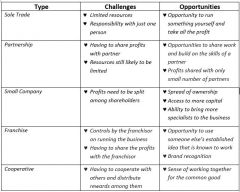![]()
![]()
![]()
Use LEFT and RIGHT arrow keys to navigate between flashcards;
Use UP and DOWN arrow keys to flip the card;
H to show hint;
A reads text to speech;
10 Cards in this Set
- Front
- Back
|
What are the challenges faced by the entrepreneur? |
♡ Identifying business opportunities ♡ Sourcing Capital ♡ Selection of Business types ♡ Choosing a location ♡ Globalization and Trade Liberization ♡ E- commerce ♡ Intellectual Property |
|
|
Identifying a business opportunity |
Alt of people want to start businesses but have not chosen a industry to start in since they cannot identify a market need. Ideas could come from previous experience from work or skills, hobbies, small budget market research etc |
|
|
What are four ways in which a business can source capital? |
♡ Owner's funds ♡ Bank Loans ♡ Venture Capital ♡ Other lenders such as bond holders ♡ Hire Purchase and leasing (for equipment) ♡ Trade Credit ♡ Government funding |
|
|
Why is sourcing finance so hard for entrepreneurs? |
♡ Lack of sufficient own finance ♡ Lack of awareness of financial support and grants available ♡ Lack of trading records to present to banks to show any previous business success ♡ Poorly produced business plan that fails to convince potential investors that the business would be a success. |
|
|
The type of business chosen |
Most entrepreneurs opt to start a sole trader organization for the start up phase of their business since it is easy and quick to start up, few legal formalities, less disclosure of accounts than with a limited company and complete control over decision making. However, this comes with some disadvantages such as unlimited liability and inability to hire high calibre employees. |
|
|
What are the opportunities and challenges that come with each type of business? |

. |
|
|
Deciding a location |
A great location needs to be chosen. The business should consider the cost of setting up, levels of taxation and subsidy for small enterprises, size of market, cost of distribution, availability of skilled (or unskilled) workers and ease of borrowing money. A key opportunity comes from being close to the market or being able to distribute at low cost and being close to transport links |
|
|
Globalization Trade Liberilization |
Globalization is the process by which businesses or other organizations develop international influence or start operating on an international scale.provides a real opportunity for small businesses to distribute worldwide. However, globalization enables foreign companies to access domestic Caribbean markets and large companies use economies of scale to sell at low costs. This can result in strong competition for smaller businesses who may not be able to produce goods at such a low cost |
|
|
E-commerce |
E-commerce links enable thousands of Caribbean enterprises to reach global markets 24 hours a day through the internet. E-preneurs can sell goods from their own home or from a low cost manufacturing and storage location. However, the challenge lies in the cost of setting up and maintaining an effective reliable website |
|
|
Intellectual property Rights |
Intellectual property is the output from creative endeavor. IPR's can be secured by registering a patent for a product design, copyright for a book, film, recorded music, registered design for the design of a product, or a trade mark for a brand or image. Then, others are not allowed to copy the idea. However, many small businesses do not know how to apply for IPR's or have insufficient resources to pay to register a patent. Furthermore to gain worldwide protection, a company must register IPR's through the World Intellectual Property Office. |

